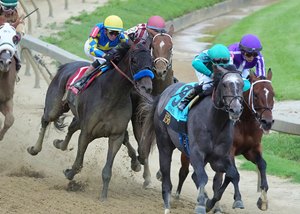Maryland Stewards Decline to Sanction Preakness Jockeys


After interviewing jockeys Umberto Rispoli and Flavien Prat via telephone May 23 and reviewing the May 17 Preakness Stakes (G1), Maryland stewards elected not to sanction either jockey for their rides that resulted in fierce bumping in early stretch.
Had stewards taken any action Friday against the riders, it would not have affected the official outcome of the $2 million race at Pimlico Race Course, which the Rispoli-ridden Journalism won by a half-length over Gosger after Journalism recovered from the bumping. Goal Oriented , ridden by Prat, ran fourth.
The decision by the three Maryland stewards—Adam Campola, Ross Pearce, and Russell Derderian—was unanimous, according to a brief statement from the stewards posted to the Maryland Racing Commission website. The stewards' meeting came six days after the Preakness, the second leg of the Triple Crown. Racing resumed in Maryland Friday at Laurel Park after a short post-Preakness break.
Journalism, drafting behind the leaders and saving ground under Rispoli, was blocked in traffic midway on the final turn. With Rispoli seeking to secure running room, Journalism was angled out nearing the stretch at a time when momentum often carries a horse outward.
Prat, meanwhile, attempted to hem in Journalism, the even-money favorite, who was just to the inside of Goal Oriented. The two horses exchanged bumps, and the riders' elbows also appeared to make contact in views from overhead drone footage televised by NBC Sports.
Ultimately, Goal Oriented's left shoulder appeared to come in and make contact with Journalism. Some theorize the contact was a reaction to Journalism moving into his left hindquarters, thereby forcing the front of his body to tilt leftward. Journalism then bumped into a tiring Clever Again , who appeared to glance off the inner rail. Clever Again was eased by jockey Jose Ortiz to finish last of nine, and exited the race with superficial cuts.
There was a stewards' inquiry to examine the contact, but no action was taken. Stewards can disqualify and alter the order of finish if they believe a foul cost an affected horse an opportunity for a better placing.
"I was in a tough spot," Rispoli said on horseback in a postrace interview on NBC immediately after the race.
He continued to praise Journalism's determination after noting they were in trouble with about a quarter-mile remaining.
The stewards' inquiry concluded after two minutes and before Rispoli had returned Journalism to be unsaddled. Riders will often be questioned by stewards in telephone conversations amid inquiries.

It could be argued that none of those affected fell short of a superior money-earning placing. Goal Oriented, who raced evenly, checked in 6 3/4 lengths behind Journalism and four lengths behind show finisher Sandman . Clever Again would have needed to have finished at least fifth to secure earnings.
The latter's trainer, Steve Asmussen, was highly critical of Rispoli's ride when speaking on "At the Races with Steve Byk" May 21, saying Rispoli rode Journalism "like a rented mule." In additional comments two days before Maryland's stewards' decision, he expressed concern about how Clever Again would react to the experience and criticized officiating by stewards across the country, which he believes to be too lax toward dangerous riding.
Sanctions against jockeys typically follow disqualifications, though stewards can also issue penalties whenever they believe an infraction has occurred.
After the 2024 Kentucky Derby, for example, Kentucky stewards fined Tyler Gaffalione $2,500 for touching rival Forever Young with his left hand nearing the finish when aboard a lugging-in Sierra Leone . Sierra Leone bumped with third-place finisher Forever Young through the stretch, and a nose separated the two at the finish. Kentucky stewards made no change to the order of finish before declaring the result official, nor did they conduct an inquiry, decisions for which they were criticized.
Kentucky stewards also fined jockey Junior Alvarado $62,000 and suspended him two days for violating riding crop strike restrictions, per Horseracing Integrity and Safety Authority rules, when riding Sovereignty to victory in this year's Kentucky Derby. Those sanctions are likely to be cut in half on appeal.
That infraction never resulted in any danger, which was unmistakable in the Preakness.
"It was just a mess," Campola said. "We got lucky nothing really bad happened."
He added that "circumstances all came together at one point."
Asked if he and his other two stewards could have sanctioned both riders if they felt evidence was inconclusive that one rider contributed to the incident, Campola said that was an option.
"So we were going back and forth about that. If you're not quite sure, then you tend to leave it alone, just like in a race," he said. "Something happens and you're kind of inconclusive about it, then you don't just do something just for the sake of doing it."
Judgment calls are often the most challenging for stewards to make, less so than those that require mere observation, such as those involving riding crop strikes.
"We do our job. We do what we think is right," Campola said. "People love to comment. That's their opinions."
Video
